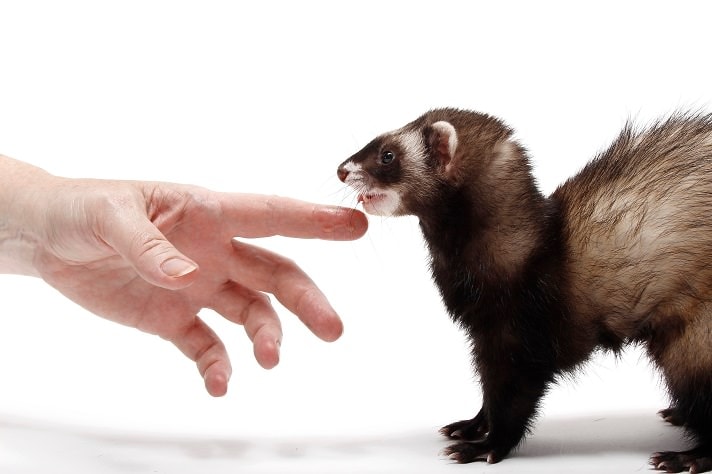Ferret Biting Behavior

Photo by Gina Cioli/Lumina Media
The vast majority of ferrets are friendly and lovable, but some might irritate humans by nipping. And an occasional problem ferret might be labeled as a “bad biter.” But hope exists for such problem ferrets, because lots of love, training and patience can lead to reform!
Biting Behaviors
All animals (even humans) bite, and they bite for a variety of reasons that can be a part of normal behavior. Biting can be used as a form of communication, a part of grooming, a process of socialization, a disciplinary measure, a defensive action or for hunting. Bites can be mild (from a little tweak with the teeth) to serious (deep puncture wounds with severe bleeding). Some animals are more likely to bite than others; this depends not only on the species, but also the individual personality of the animal and its environmental situation.
“Based on the information gleaned from sources such as the Ferret Mailing List and vets and individuals I’ve talked with, I would say that a ‘bad biter’ is not at all typical,” said Todd Leuthold, a Pennsylvania ferret owner who has named the group of ferrets that live with him the Fuzzbutt Rodeo Clowns. “Any ferret that has been handled properly its entire life is about as docile a pet as you can find.”
If you have a ferret that nips or bites, determine why it bites through careful observation of behavior and an understanding of the ferret’s history.
“I do not believe there are many bad biters among pet ferrets,” said Randy Belair, founder and president of The Ferret Aid Society in Toronto. “It’s not the biting ferret that needs to be worked on, it’s the human who cares for it.”
Normal Nipping
Some nipping is normal, but even this must be unlearned. Ferrets use their mouths for more than just eating; they use it as both a communication and a defense tool, and for investigating their environment.
Your ferret must be taught, preferably at an early age, the acceptable limits of nipping behavior.
When my ferret Chester wants to be picked up for snuggling, he sits under my feet and looks straight up. If I don’t see him, he puts a paw on my ankle. If I’m still unresponsive, he digs at my foot. At this point, I am well enough trained to respond. If I don’t, I’ll receive a firm ankle chomp. I can’t pick him up after that or it would reward his biting behavior.
Like Chester, most ferrets nip for attention if an earlier request is ignored. Baby ferrets (kits), especially, nip as an invitation to play. But ferrets have very tough skin, and a play-bite to another ferret may be an “ouch-nip” to a human. Ferrets must be gently taught that nipping a human is not socially acceptable behavior. Kits that nip and are not corrected may grow into adults that bite.
Training Tips For Normal Nipping
How do you correct normal nipping? Teach your pet that the behavior is unwelcome. Pick it up, loudly say “No!” and set it down. Be sure you always use the exact same words or sounds when you make a correction, so the ferret associates the sounds you make with the actions it did. If it continues the bad behavior, add a five-minute timeout in a travel carrier (ferrets won’t understand more than five minutes, so more punishment is not better).
Timeouts in the ferret’s cage are not advisable — the cage should be a safe haven and home, not a punishment facility. Also, using the cage for punishment might train a ferret that wants to be in its cage that nipping you is the way to get there.
Leuthold recommended an “avoidance” technique for toe-biters trying to play: “If the ferret comes after your foot, for example, move the foot completely out of the way. I don’t mean move it an inch or two. If you are walking, step completely over the ferret and move quickly. If you are sitting on furniture, pick the foot up and tuck it under your leg. If you are on the floor, scoop the ferret up and point it in another direction and put it back down.”
A stronger alternative is to scruff your ferret by gently grasping the skin on the back of its neck and picking it up. Hold it like this, while supporting the hind legs and body weight, until it calms down.
A final series of tougher solutions include blowing on the ferret’s face, pressing (not pinching) the ferret’s ear between the pad of your thumb and finger, or gently tugging on the whiskers. Most ferrets don’t like these treatments and will learn not to bite. These physical solutions should only be used after the failure of consistent applications of other corrections, such as verbal cues and timeouts.
Never, ever use a physical punishment that inflicts pain, such as nose flicking, thumping, slapping, pinching or biting back. The ferret will only bite harder the next time, and lock the two of you in an escalating competition of aggression.
Dos And Don’ts
If your ferret bites while you hold it, don’t reward it for biting by putting it down without a reprimand — that may be just what it wanted. You must show your ferret you are the boss.
A play-biter can be the most frustrating type of nipper. These playful pranksters don’t realize they’re inflicting pain. Often (especially with children), attempts to keep from being bitten can send the wrong signals to the ferret. A person who jumps, squeals and squirms to keep from being bitten seems like a perfect playmate to a ferret.
When my new kit, Zodiac, ran up and bit me on the foot to ask to play, I gritted my teeth and refused to respond. She soon learned that nipping my feet wasn’t worth the effort, because it got no results. When she nipped my husband’s feet, however, he jumped around, yelled and chased her. This reaction was great fun for Zodiac, who would wildly weasel-war dance and go in for more. Zodiac continued to single him out until he learned to adjust his behavior.
Always reward good behavior instead of bad. Teach your ferret to roll over or sit up to ask for attention or a treat. Ignore or discipline bad behavior, and reward good behavior. Use these guidelines, and you’ll soon have a well-behaved ferret.
Mouth Mistakes
Some bites can’t be blamed on the ferret. A common “mistake” bite is on a human’s nose. Ferrets don’t see that well. If you bring a ferret directly up to your face, all the ferret sees is a giant human nose looming toward its blind spot (right in front of the ferret’s nose). An immediate reaction is to latch on to the intruding object to keep it out of the way or see whether it is something to eat.
Some ferrets bite at smells that either irritate or entice their noses. Irritants such as nail polish remover, glues, paints, cleaning solvents or other chemicals on your hands may invite a bite. Yummy smells such as scented cosmetics, lotions, perfumes or soaps also invite a grab. Before you discipline a ferret for biting, determine whether the nip resulted from your mouthwash, breath freshener, deodorant, smoking, body powder, shampoo, shaving cream or other smell.
Ferrets may also bite at ear irritants. Some squeaky toys, kazoos and bagpipes have caused my ferrets to become upset.
Another “mistake” bite results from sheer surprise. If you grab a sleeping ferret, a normal defensive motion is to nip. Deaf and blind ferrets are particularly prone to snapping when surprised and are only biting because they are scared.
“Never grab a blind ferret without first making your presence known through sound,” said Kathleen (state withheld), an experienced ferret owner. “Speak his name and blow on his fur. Then try picking him up slowly, supporting his whole body, making sure he feels secure, and always speak calmly to him to soothe him. A deaf ferret may act similarly. Never grab him unless he’s looking directly at you, or it will startle him and he may bite. It is best to stomp your feet to get your deaf ferret’s attention. Then pick him up.”
Blind and deaf ferrets can be easily trained with the “normal nipping” methods mentioned above, but it is up to you to alert your handicapped ferret that you are around and will be interacting with it.
New Nipper
If your ferret doesn’t normally nip and suddenly nails you, it may have a medical problem. “Immediately get it to a ferret-knowledgeable vet for an exam,” Leuthold said. “Biting is a last resort for most ferrets, so this behavior means something is seriously wrong. Don’t ignore this message!”
A sick or injured ferret wants you to notice that something isn’t right, and sometimes biting is the only way to get your attention. Don’t discipline your ferret, just take it to the veterinarian.
Intact ferrets (not neutered) are more likely to bite when they go into season because their hormones govern their actions (yet another reason to get your ferret fixed).
New nipping behaviors may be associated with simple chemical changes in the body, but don’t excuse or reward the behavior, and take the ferret to the vet for a checkup (or to get neutered) in case something is wrong. Hormonal changes can also be caused by adrenal gland disease in altered ferrets, so treating the adrenal tumor can eliminate biting behaviors.
Environmental changes can also stress a ferret and lead to biting behavior. Moving to a new place, divorce, odd hours, houseguests and travel can all cause ferret crankiness. Environmental changes both scare a ferret and make it feel insecure. Changes may also cause additional demands in the human’s life so that not enough attention is paid to the ferret during the stressful time.
If you have a temporary environmental change in your house that keeps you busy, don’t forget about your ferret’s needs! Hungry ferrets may bite to grab whatever might be food. And ferrets may bite when they resent being caged up for long hours; a bored ferret is usually a biting ferret. The solution is to play more often with your ferret — more handling leads to fewer tooth marks, not more. Additionally, a ferret that is feeling stressed and insecure about all the changes around the house needs extra loving attention. Again, don’t punish your ferret — ward off nipping by giving special attention to your pet.
Problem Ferrets
If you eliminate all the above possible causes of biting, yet still have a biting ferret, you may be dealing with one of those few ferrets called a “bad biter.” These ferrets bite intentionally and hard — down to the bone. They often “latch on” and lock down on their victim, causing painful, bloody bite wounds. Two types of bad biters seem to exist. One is a dominant biter, and the other is a fear biter. For both types, the keys to rehabilitation are patience and consistency.
If you decide to rehabilitate your bad biter, expect to get bitten. Make sure your tetanus and rabies shots are up-to-date and have bandages on hand. No matter what pain you receive, you need to give bad biters unconditional love and acceptance. You need to have the patience to stay calm and not react physically to the bite. Daily (or more frequent) interaction is crucial, so the ferret learns that human contact is part of normal life. Paige Townsend, vice president of the Ferret Aid Society of Toronto, allows a problem ferret to bite her on many occasions with no repercussions. This teaches the ferret that it won’t be hit for biting.
One of the hardest temptations to resist when rehabilitating a bad biter is the use of gloves. Using gloves may protect your hands, but they can also make the problem worse. A fear biter sees a much larger and scarier hand and becomes even more fearful. Bad biters also learn they can bite hard and do little damage, so when the gloves come off, look out! Only use gloves if all else fails.
Some of the initial solutions for a bad bite are last resorts only. Some people use bad-tasting sprays or creams (bitter apple, bitter lime or pepper) so the ferret is punished for biting by a bad taste. This solution should be used on a temporary basis only, because it only masks the behavior when the spray is present, and doesn’t solve the underlying behavioral problem in the long term.
If you are the recipient of a latch-on bite, and you can’t get the ferret to let go, don’t yell or use force because fear will make the ferret clamp down harder. Instead, cover the ferret’s nostrils with the thumb and forefinger of your free hand — the ferret may let go to breathe. As a final resort, run the ferret’s face under water. It is unlikely you can force the ferret’s jaws apart without causing some damage to the ferret.
The Boss Biter
An “alpha” ferret needs to be dominant and bites as a way to show who is boss, and because it can. Deep-seated insecurities and a lack of socialization usually cause this biting behavior. This type of ferret needs to keep others (including humans) at a submissive level. Size doesn’t matter; these ferrets have learned that one good bite will fix anything. For such ferrets, it is extremely important not to show fear or use harsh punishments (they will just bite harder and more often). However, you must show them you are the boss.
The fastest way to get the point home to this type of ferret is to scruff it immediately after it bites, and speak firmly to it (always use the same words for corrections). Then rub it along the floor or couch two or three times. This action simulates the dominant behavior of another ferret. By doing this, you show that you are dominant.
“A truly dominant ferret will not accept this action the first few times you do it,” Leuthold said. “As soon as you let it go, it may rush you and try to bite you again. Be consistent! Grab it again, holler, then scruff-and-drag it. If you do this enough times and each time it tries to bite, it will eventually get the point. It can take a week or two, but you have to do it every time for it to work.”
The Fear Biter
The fear biter usually evolves due to abuse or neglect. According to many shelter operators, this is the most common type of bad biter. These ferrets bite because humans have always hurt them. Some of these ferrets direct their biting at the type of human who abused them (such as a child or an adult male).
Rascal’s owner would slam his tail in a door to “keep him in his place” and when I rescued Rascal, he was a vicious biter. I first took Rascal to the vet to have his tail amputated (it had countless fractures and gangrene had set in). The amputation started the physical healing process to relieve Rascal’s pain. The mental healing process took much longer. A few months of patience allowed Rascal to decide that female humans were acceptable, but it took another year before he quit attacking men. And then he turned into the perfect gentleman, and never bit again. It helped that Rascal socialized with Bear, a ferret that had his tail amputated because of a tumor. These two stubby-tailed sables were inseparable, and always strolled around together.
A frightened ferret, especially one that is frightened all the time, should be placed in a confined area for a period of time, with minimal contact with others (human, ferret or other pets). Minimal contact allows a ferret time to calm down, understand and accept its new surroundings. This could last hours, days or weeks. In my personal experience, some ferrets settled down in a few hours, most within a day, but some took months.
Once the ferret is calm, start the rehabilitation process with soothing, gentle interactions punctuated by many treats and good experiences. You can judge a calm ferret by its state of agitation and whether it retreats in fear or seems curious about its surroundings. Invest the time and you could be rewarded with a sweet ferret.
Deborah Kemmerer Cottrell, DVM, of the West End Animal Hospital in Newberry, Fla., believes that the drug clomipramine hydrochloride, which is used to calm dogs, may help calm problem ferrets and help them accept new surroundings. However, the drug has not yet been tested extensively on ferrets.
Hopeless Cases?
I asked a number of ferret rehabilitators if there were ever any hopeless cases. “There are never hopeless ferret cases, only hopeless ferret owners,” Kathleen said.
“If you are willing to invest the time, effort and attention necessary, any ferret — other than a sick one, who has no real choice — can be rehabilitated,” Leuthold said.
“In 10 years of ferret sheltering, I have never seen a hopeless case of biting. There is always a cause and always a solution,” Belair said.
After my first experience with a bad biter, I believe that no ferret is completely unable to be rehabilitated. However, not every home is able to provide the necessary means to perform the rehabilitation, despite it being stocked with ferret supplies. It is up to the owner to decide which is which. Just remember that every ferret is different, and every situation is different, so some detective work and patient training on your part is an important part of the solution.



